Skip straight to map. Skip straight to list.
The Coffee Spot Guide to Tokyo
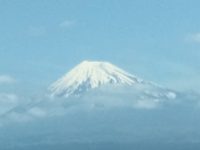 The Japanese capital of Tokyo is, in my experience, a city like no other, a vast, sprawling metropolis that, like London and New York, would take a life-time to fully do justice to. It’s a city of many different characteristics, from the hustle of Shibuya to the gorgeous gardens of the Imperial Palace next to the high-rises of Ginza. It’s also a city by the sea, easy to forget when you are lost amongst the skyscrapers of Shinjuku. Despite its size, it’s easy to get around by public transport, partiuclarly the metro (with all the information and signs in English) and it’s surprisingly walkable, rewarding the random stroll with unexpected vistas and quiet streets next to busy highways.
The Japanese capital of Tokyo is, in my experience, a city like no other, a vast, sprawling metropolis that, like London and New York, would take a life-time to fully do justice to. It’s a city of many different characteristics, from the hustle of Shibuya to the gorgeous gardens of the Imperial Palace next to the high-rises of Ginza. It’s also a city by the sea, easy to forget when you are lost amongst the skyscrapers of Shinjuku. Despite its size, it’s easy to get around by public transport, partiuclarly the metro (with all the information and signs in English) and it’s surprisingly walkable, rewarding the random stroll with unexpected vistas and quiet streets next to busy highways.
The Japanese have long had a love affair with coffee, starting with the traditional kissaten, more akin to a bar than a coffee shop, several of which still remain, dotted around the city. There’s a strong homegrown scene, blending the more tradtional darker roasts with lighter, third-wave style, coupled with an emphasis on service. At the other end of the scale, foreign influences abound, with Australian, New Zealand, European and American coffee shops and roasters all prominantly on show.
Starting in 2017, I’ve become a regular visitor to Tokyo, and I’m slowly expanding my knowledge of its large and varied speciality coffee scene, particularly around the twin hubs of Shibuya and Omotesando, where I am usually based. However, there’s great coffee to found throughout the city. Like all these guides, I do not claim it is comprehensive and I apologise if I have missed your favourite coffee shop!
For some alternative views of Tokyo (and the wider Japanese coffee scene), here’s a list of other sources and guides I compiled for my first visit to Tokyo in 2017.
Header image: the Tokyo skyline from the Sky Tree, with the high-rise clusters of Ginza (left) and Shinjuku (right) emerging through the smog.
Coffee Spots
About Life Coffee Brewers
 About Life Coffee Brewers is part of the small Onibus Coffee group which has its own roastery in Yakumo, although it also serves coffee from two other Tokyo roasters, Switch Coffee Tokyo and Amameria Espresso. No more than a coffee stand at the top (western) end of Dōgenzaka in Shibuya, it’s something of an institution and a favourite of many visitors to the city. Serving mostly takeaway customers (so don’t forget to bring your own cup), you can stand at the counter or sit on one of two benches down the side. There’s also a semi-secret sheltered standing-room only area inside, which is handy if it’s raining.
About Life Coffee Brewers is part of the small Onibus Coffee group which has its own roastery in Yakumo, although it also serves coffee from two other Tokyo roasters, Switch Coffee Tokyo and Amameria Espresso. No more than a coffee stand at the top (western) end of Dōgenzaka in Shibuya, it’s something of an institution and a favourite of many visitors to the city. Serving mostly takeaway customers (so don’t forget to bring your own cup), you can stand at the counter or sit on one of two benches down the side. There’s also a semi-secret sheltered standing-room only area inside, which is handy if it’s raining.
For such a small spot, About Life has a large output. There’s a concise with/without milk espresso menu, with the Onibus house-blend used for milk drinks and blends from the other two roasters available as espresso/Americano. However, what’s really impressive is the selection of six single-origins, two from each roaster. These can be had as an espresso (no milk) or as a pour-over through the V60. All the coffee, espresso and pour-over, can be had hot, or with ice. The selection of single-origins is seasonal, changing every two to three months.
Continue reading...Blue Bottle Coffee, Aoyama
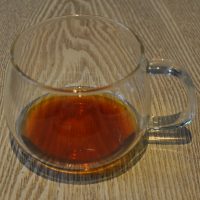 Blue Bottle Coffee is something of an institution in California, with numerous outlets in Los Angeles and the Bay Area. From its base, Blue Bottle has spread both east, with branches on the east coast, ranging from Miami to Boston, and west, where it’s crossed the Pacific Ocean to Japan, with branches in Kobo, Kyoto and as of 2019, fourteen in Tokyo.
Blue Bottle Coffee is something of an institution in California, with numerous outlets in Los Angeles and the Bay Area. From its base, Blue Bottle has spread both east, with branches on the east coast, ranging from Miami to Boston, and west, where it’s crossed the Pacific Ocean to Japan, with branches in Kobo, Kyoto and as of 2019, fourteen in Tokyo.
My relationship with Blue Bottle in the US has been a bit hit and miss, liking some places, but not others. However, based on my limited experience in Tokyo, I’m smitten by Blue Bottle in Japan. The branch in Aoyama was around the corner from my office when I visited in April last year, one of a cluster of excellent coffee shops, all within easy walking distance of the office, that include Japanese café/roaster Sarutahiko Coffee and two further foreign-influenced coffee shops, Coutume and Café Kitsuné, both of whom have their roots in Paris.
Blue Bottle serves a single-origin and blend on espresso, with another single-origin and blend on pour-over, plus two more single-origins on syphon. There’s also a concise breakfast/lunch menu and a selection of cakes. Of all the places I visited in Japan, it is the most American in terms of service and style.
Continue reading...Blue Bottle Coffee, Nakameguro
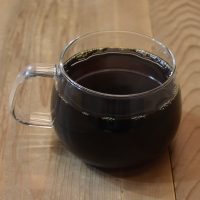 It’s weird, given how few of Blue Bottle’s US outlets meet my “places where I like to have coffee” criteria, that I’ve adored all three Blue Bottle locations that I’ve visited in Tokyo. Today is the turn of Blue Bottle’s Nakameguro coffee shop, which I first visited during last summer’s trip. It occupies a tall, narrow building, all concrete and glass, that was purpose-built as a factory. The coffee shop is at the front on the ground floor, with additional seating in a basement-like space to the rear, above which is a training area/lab. The top two floors, meanwhile, are Blue Bottle’s offices.
It’s weird, given how few of Blue Bottle’s US outlets meet my “places where I like to have coffee” criteria, that I’ve adored all three Blue Bottle locations that I’ve visited in Tokyo. Today is the turn of Blue Bottle’s Nakameguro coffee shop, which I first visited during last summer’s trip. It occupies a tall, narrow building, all concrete and glass, that was purpose-built as a factory. The coffee shop is at the front on the ground floor, with additional seating in a basement-like space to the rear, above which is a training area/lab. The top two floors, meanwhile, are Blue Bottle’s offices.
The offering’s very similar to the other Tokyo Blue Bottles that I’ve visited, with reduced food options compared to the Aoyama coffee shop. The usual espresso-based menu has the current seasonal blend plus a single-origin, with options including macchiato, Gibraltar, cappuccino and latte, along with cold-brew and iced coffee. This is allied with a strong pour-over offering, with six Blue Bottle drippers lined up on the counter-front, each standing on in-built scales. There’s a choice of a dedicated pour-over blend, plus a daily single-origin (different from the espresso). If you’re hungry, there’s cake, waffles and a panini.
Continue reading...Blue Bottle Coffee, Shinagawa Station
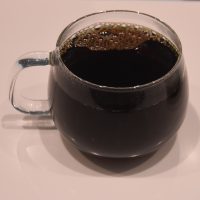 Blue Bottle Coffee at Shinagawa Station is its sixth (of currently 14) locations in Tokyo, opening at the end of 2016, just after the Nakameguro branch. I discovered it on my first visit to Japan in April 2017, when I based myself near the station, catching the bullet trains on a daily basis as I explored Japan. As a result, it became a regular calling point first thing in the morning, with a pre-departure cappuccino to go in my SoL Cup. Since then, I’ve made a point of popping by whenever I’m changing trains in the station (which, admittedly, hasn’t been very often).
Blue Bottle Coffee at Shinagawa Station is its sixth (of currently 14) locations in Tokyo, opening at the end of 2016, just after the Nakameguro branch. I discovered it on my first visit to Japan in April 2017, when I based myself near the station, catching the bullet trains on a daily basis as I explored Japan. As a result, it became a regular calling point first thing in the morning, with a pre-departure cappuccino to go in my SoL Cup. Since then, I’ve made a point of popping by whenever I’m changing trains in the station (which, admittedly, hasn’t been very often).
Despite being a station coffee shop, Blue Bottle, following the best traditions of Japanese station coffee shops such as Ogawa Coffee at Kyoto Station and Maruyama Coffee at Nagano Station, has a full offering in line with most other Blue Bottle locations in the city, although it lacks the extensive food offerings of the Aoyama coffee shop. The seasonal Hayes Valley blend is on espresso, along with a regularly-changing single-origin, while there’s a dedicated filter blend, different a single-origin and decaf on pour-over. There’s also a strong retail offering, plus a small range of cakes and snacks.
Continue reading...Bread, Espresso &
 Bread, Espresso & pretty much does what the name says, serving bread-based dishes, espresso-based drinks and a few other things from its original store in Omotesandō, a bustling district that’s seen the birth of some of Tokyo’s best coffee. So successful has it been that there are now 16 branches dotted around Tokyo and beyond, including a pair of new locations in Kyoto (which opened in the summer of 2019).
Bread, Espresso & pretty much does what the name says, serving bread-based dishes, espresso-based drinks and a few other things from its original store in Omotesandō, a bustling district that’s seen the birth of some of Tokyo’s best coffee. So successful has it been that there are now 16 branches dotted around Tokyo and beyond, including a pair of new locations in Kyoto (which opened in the summer of 2019).
I’ll be honest: Omotesandō has many great coffee options and, as such, Bread, Espresso & is not somewhere I come for the coffee alone. That said, in a city where the non-speciality coffee can frequently be disappointing, Bread, Espresso &’s coffee has always been spot-on, plus it makes an excellent breakfast (until 10:00) and lunch spot, as well as a take-away bakery. There’s not a lot of seating, but for both my visits, table turn-over was high and the staff will always fit you in if possible.
Continue reading...Café de L’Ambre
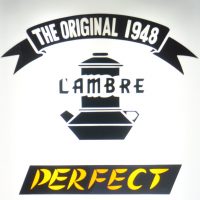 So far in covering Tokyo’s Coffee Spots, I’ve written about Maruyama Coffee, a modern take on a traditional Japanese, service-oriented coffee shop and Kaido Books & Coffee, which any aficionado of western, third-wave coffee shops would instantly recognise. For today’s Coffee Spot, however, I wanted to write about Café de L’Ambre, a traditional Japanese kissaten.
So far in covering Tokyo’s Coffee Spots, I’ve written about Maruyama Coffee, a modern take on a traditional Japanese, service-oriented coffee shop and Kaido Books & Coffee, which any aficionado of western, third-wave coffee shops would instantly recognise. For today’s Coffee Spot, however, I wanted to write about Café de L’Ambre, a traditional Japanese kissaten.
This is a very different beast, more akin to a bar than a coffee shop. In the case of L’Ambre, all the coffee is roasted on-site on a pair of small roasters at the front of the store, while coffee is made and consumed at the back, in a long, low, smoky room with a counter/bar on the left and a handful of tables on the right.
If you can, sit at the counter, the further along the better, where you can watch your coffee being prepared for you using a linen filter. This is really old-school: no scales, timers or temperature-controlled kettles. It’s coffee as a performance and although the end result might not please everybody, it’s an experience I would recommend trying. Be warned, though, L’Ambre allows smoking and it’s pot-luck whether you end up sat next to someone lighting up a cigarette.
Continue reading...Chatei Hatou
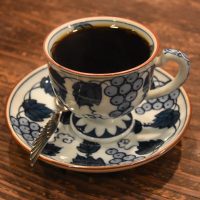 Japan has a wide, varied coffee culture stretching back to, I believe, the inter-war years. Although Japan has moved with the times, accepting and adapting modern trends in coffee, such as lighter roasting, the old traditions live on. On my first visit in 2017, I wrote about Café de L’Ambre, a traditional Japanese kissaten. I also visited Chatei Hatou (once I’d found it!) but didn’t have a chance to write it up. Since it was just around the corner from my hotel, it was another place I made a beeline for on my return to Tokyo this week.
Japan has a wide, varied coffee culture stretching back to, I believe, the inter-war years. Although Japan has moved with the times, accepting and adapting modern trends in coffee, such as lighter roasting, the old traditions live on. On my first visit in 2017, I wrote about Café de L’Ambre, a traditional Japanese kissaten. I also visited Chatei Hatou (once I’d found it!) but didn’t have a chance to write it up. Since it was just around the corner from my hotel, it was another place I made a beeline for on my return to Tokyo this week.
The traditional Japanese kissaten is more akin to a bar than a modern coffee shop. Both Chatei Hatou and Café de L’Ambre are long, low, windowless buildings where patrons are still allowed to smoke (although on both my visits Chatei Hatou wasn’t too smoky, perhaps due to the air-conditioning). Only serving pour-over coffee, the best seats are at the counter, where you can watch the coffee being made on a near-continuous basis. Alternatively, there are a number of tables, more cosy two-person ones and some larger, ten-person ones, in the relatively spacious interior. Finally, there’s an impressive range of cakes to tempt you.
Continue reading...Coffee Supreme, Tokyo
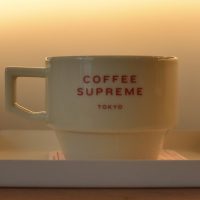 Tokyo has, I quickly discovered, a very international coffee scene, something it has in common with London, with brands from all around the world. This includes California in the USA (Verve, Blue Bottle), Europe (Fuglen, Stockholm Roast) and Australia (Single-O). New Zealand is represented by the likes of Allpress, and, since October 2017, Coffee Supreme, which opened in Shibuya, a couple of streets away from the original Fuglen.
Tokyo has, I quickly discovered, a very international coffee scene, something it has in common with London, with brands from all around the world. This includes California in the USA (Verve, Blue Bottle), Europe (Fuglen, Stockholm Roast) and Australia (Single-O). New Zealand is represented by the likes of Allpress, and, since October 2017, Coffee Supreme, which opened in Shibuya, a couple of streets away from the original Fuglen.
I first visited in July 2018, tipped off by Little Nap Coffee Stand, calling back a year later during my visit in September this year. Located in the tangle of streets north of Shibuya station, Coffee Supreme is at the southwestern edge of Yoyogi Park, occupying the ground floor of a long, extremely thin building that’s also home to a pair of Kiwi restaurants.
The coffee is from Coffee Supreme’s Melbourne roastery, with house-blend, guest and decaf on espresso, the menu including Kiwi staples such as flat white and long black. There are three monthly single-origins, one of which is on batch brew, the option changing daily, with all the beans (blends and single-origins) available in retail bags. There’s also craft beer, and, if you’re hungry, a small range of cakes, toast and pies.
Continue reading...Fuglen Asakusa
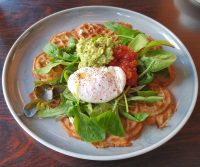 Japan’s speciality coffee scene is an interesting blend of homegrown roasters/coffee shops, plus a generous sprinkling of overseas names. Perhaps the most intriguing of these (for me, at least) is Fuglen, the Norwegian design company, which first opened its doors in Oslo in 1963. These days, Fuglen blends vintage design with coffee (daytime) and cocktails (evening) from its Oslo café/bar, a recipe which, since 2012, it has successfully copied in Tokyo, with a small and perpetually busy café/bar in Shibuya.
Japan’s speciality coffee scene is an interesting blend of homegrown roasters/coffee shops, plus a generous sprinkling of overseas names. Perhaps the most intriguing of these (for me, at least) is Fuglen, the Norwegian design company, which first opened its doors in Oslo in 1963. These days, Fuglen blends vintage design with coffee (daytime) and cocktails (evening) from its Oslo café/bar, a recipe which, since 2012, it has successfully copied in Tokyo, with a small and perpetually busy café/bar in Shibuya.
This was followed, in 2014, by a roastery/coffee shop (since relocated to larger premises) and, in September last year, by a much larger café/bar in Asakusa. Spread over two floors, it opens from first thing in the morning until last thing at night, offering breakfast, lunch, cakes, coffee and cocktails, all within a setting heavily influenced by vintage Norwegian design.
All the coffee’s roasted in-house, with a seasonal single-origin espresso, plus multiple filter options, available as pour-over (through the V60), Aeropress or batch-brew. There’s also a tasting flight, with an espresso, batch-brew and your choice of beans through the Aeropress. I visited twice, once in October 2018, a month after it opened, and a year later in November this year.
Continue reading...Glitch Coffee Brewed @ 9h
 I first came across Tokyo’s Glitch Coffee & Roasters on my around the world trip in 2018. Then, I knew it as a small coffee shop/roaster, with a passion for light roasts and filter coffee. When I returned to Tokyo in September this year, I learnt that there was a second branch of Glitch, in Asakaka, closer to my hotel, so on my final day in Tokyo, I set out to explore.
I first came across Tokyo’s Glitch Coffee & Roasters on my around the world trip in 2018. Then, I knew it as a small coffee shop/roaster, with a passion for light roasts and filter coffee. When I returned to Tokyo in September this year, I learnt that there was a second branch of Glitch, in Asakaka, closer to my hotel, so on my final day in Tokyo, I set out to explore.
Glitch Coffee Brewed is in the basement lobby of Nine Hours, a newly-opened capsule hotel, both hotel and coffee shop having opened in May this year. There’s not much seating, just nine stools at a U-shaped counter, with a bench inside and another outside. It doubles down on Glitch Coffee & Roasters’ filter obsession, only offering pour-over (via the V60), with a similar range of beans and tasting flights. If you can’t wait, there’s also batch-brew during the week.
Continue reading...Glitch Coffee & Roasters
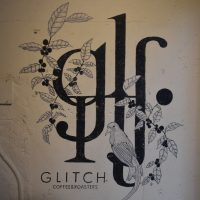 If you take a look at my coffee map of Tokyo, you’ll see that it’s strongly focused on Shibuya, Omotesandō and Aoyama, where I’ve spent most of my time, usually for work. Today’s Coffee Spot, Glitch Coffee & Roasters, is, in that sense, unusual. A well-established roastery/coffee shop, it’s located in Jimbōchō, just to the north of the Imperial Palace gardens, with a recently-opened second location, Glitch Coffee Brewed, in the Nine Hours capsule hotel in Akasaka.
If you take a look at my coffee map of Tokyo, you’ll see that it’s strongly focused on Shibuya, Omotesandō and Aoyama, where I’ve spent most of my time, usually for work. Today’s Coffee Spot, Glitch Coffee & Roasters, is, in that sense, unusual. A well-established roastery/coffee shop, it’s located in Jimbōchō, just to the north of the Imperial Palace gardens, with a recently-opened second location, Glitch Coffee Brewed, in the Nine Hours capsule hotel in Akasaka.
Like many of Tokyo’s speciality coffee shop/roasters, Glitch Coffee & Roasters is a pretty small affair, with the roaster, a 5kg Probat, in the actual coffee shop on the right-hand side, in full view of the customers. Although a pair of single-origins are available on espresso, the focus is firmly on pour-over, where a further selection of single-origins (typically five or six) are available through the V60. All the beans are, naturally, available in retail bags, with Glitch specialising in light roasts.
Of particular interest to me were the tasting flights, where you can try two or three of the single-origin pour-overs (chosen by Glitch) side-by-side. A recent addition is the Geisha tasting flight, where you can compare two Geishas, again as pour-overs.
Continue reading...Kaido Books & Coffee
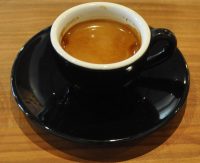 Kaido Books & Coffee was just down the street from my third (and final) hotel in Tokyo during my first trip to Japan in 2017. I’d done extremely well when it came to good coffee near hotels/work on that trip and Kaido (plus Blue Bottle Coffee at Shinagawa Station) was the icing on the cake. It was also a surprise, a random discovery as I explored the rather lovely residential street I was unexpected staying on. I made a few visits during my stay in 2017, popping back again on my return to Tokyo in July 2018.
Kaido Books & Coffee was just down the street from my third (and final) hotel in Tokyo during my first trip to Japan in 2017. I’d done extremely well when it came to good coffee near hotels/work on that trip and Kaido (plus Blue Bottle Coffee at Shinagawa Station) was the icing on the cake. It was also a surprise, a random discovery as I explored the rather lovely residential street I was unexpected staying on. I made a few visits during my stay in 2017, popping back again on my return to Tokyo in July 2018.
Kaido Books & Coffee does what it says on the tin: a book shop combined with a coffee shop. In fairness, though, it’s more like a coffee shop with plenty of books. In fact, I didn’t see anyone buy a book the whole time I was there! It seems that the books are more for the customers to browse while lingering over coffee.
Kaido serves coffee from And Coffee Roasters and Ishikawa Coffee, with a choice of three single-origins on pour-over through the V60, one of which was also available on espresso. Kaido does a limited range of food, which includes a small cake selection.
Continue reading...Koffee Mameya
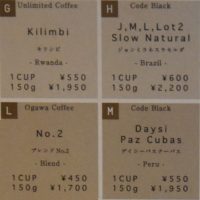 Koffee Mameya, which literally translates as Coffee Beans, is something of a name in speciality coffee circles. The successor to the famed Omotesando Koffee, a legendary pop-up coffee shop that once stood on the same physical site, going to Koffee Mameya is somewhat akin to going on a pilgrimage for the speciality coffee lover.
Koffee Mameya, which literally translates as Coffee Beans, is something of a name in speciality coffee circles. The successor to the famed Omotesando Koffee, a legendary pop-up coffee shop that once stood on the same physical site, going to Koffee Mameya is somewhat akin to going on a pilgrimage for the speciality coffee lover.
Technically Koffee Mameya isn’t a coffee shop; it’s a retailer with a tasting bar where you can try the beans before you buy. It’s also tiny, an almost cube-shaped, wood-clad, windowless box with no seats, just a counter at the back and, more often than not, a queue out of the door.
Koffee Mameya works with seven roasters, four from Japan and one each from Denmark, Hong Kong and Melbourne. There are up to 25 different beans available at any one time (there were 18 choices on offer when I visited) arranged by roast profile from light to dark. Since Koffee Mameya is all about the taste, there’s no milk here (and definitely no sugar), with the coffee available to try as either pour-over through the Kalita Wave or espresso, using a customised Synesso Hydra built into the counter-top. There are also cold-brew samples on hand.
Continue reading...Lattest
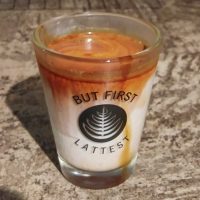 Lattest, the self-style Omotesando Espresso Bar, is in good company, Omotesando being the home of several excellent coffee shops, including Sarutahiko Coffee, Ratio &C and, of course, Koffee Mameya. It’s also across the street from Bread, Espresso &, where I had started my current Tokyo coffee adventures the day before. It also helps that Lattest is a few minutes’ walk from both my hotel and my office for this trip.
Lattest, the self-style Omotesando Espresso Bar, is in good company, Omotesando being the home of several excellent coffee shops, including Sarutahiko Coffee, Ratio &C and, of course, Koffee Mameya. It’s also across the street from Bread, Espresso &, where I had started my current Tokyo coffee adventures the day before. It also helps that Lattest is a few minutes’ walk from both my hotel and my office for this trip.
Lattest began in 2012 and now boasts six branches, this being the original. There’s an evening espresso/alcohol bar in Azabujuban, a bag/shoe shop across the road (but not coffee) and three coffee/bike shops, continuing the long association between espresso and cycling. Two are in Tokyo, with the third in Kyoto.
Lattest does pretty much what the name says, serving a range of espresso-based drinks, including the synonymous “lattest”, an espresso shot over cold milk. All the coffee is roasted in-house, originally on the roaster in Glitch Coffee, but now at its own dedicated roastery. There are two single-origins on espresso, plus three others roasted for filter and available to buy in retail bags. During the week, you can order pour-over, plus there’s a small selection of other drinks, a handful of cakes and a toasted sandwich option if you want something more savoury.
Continue reading...Little Nap Coffee Roasters
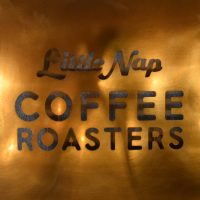 I discovered Little Nap, the Tokyo-based coffee shop/roaster chain (of precisely two locations) when I visited the original, Little Nap Coffee Stand, in the summer of 2018. During that trip I also popped over to the second location, Little Nap Coffee Roasters, a short, 10-minute walk to the southwest. However, for various reasons, I never managed to write it up, so last week, on my most recent trip, I returned to check that nothing had changed.
I discovered Little Nap, the Tokyo-based coffee shop/roaster chain (of precisely two locations) when I visited the original, Little Nap Coffee Stand, in the summer of 2018. During that trip I also popped over to the second location, Little Nap Coffee Roasters, a short, 10-minute walk to the southwest. However, for various reasons, I never managed to write it up, so last week, on my most recent trip, I returned to check that nothing had changed.
Little Nap occupies a narrow, three-storey, standalone building on the south side of the busy highway which runs through the southern end of Yoyogi Park to the east. Downstairs, at the front, is a compact coffee shop, while at the back is an equally compact roastery. The first floor is home to the Little Nap Record Shop and, during my visit in 2018, hosted a pop-up kitchen, while the top floor is a gallery with rotating displays.
Little Nap serves a house-blend from a concise, espresso-based menu, with four seasonal single-origins on pour-over (hot or cold), with all the coffee available to buy in retail bags. There’s also a small range of sandwiches and hot dogs, plus a selection of cakes if you’re hungry.
Continue reading...Little Nap Coffee Stand
 In a small corner in the northwest Shibuya in Tokyo, west of Yoyokgi Park, there’s an interesting cluster of coffee shops, including the new branch of Switch Coffee Tokyo opposite Yoyogi-Hachiman station, another new arrival, Coffee Supreme Tokyo, and old hand, Fuglen. However, one can argue the trendsetter that started it all is just a little north of the station, where you’ll find a tall, thin building backing onto the railways tracks, home, since 2011, to Little Nap Coffee Stand.
In a small corner in the northwest Shibuya in Tokyo, west of Yoyokgi Park, there’s an interesting cluster of coffee shops, including the new branch of Switch Coffee Tokyo opposite Yoyogi-Hachiman station, another new arrival, Coffee Supreme Tokyo, and old hand, Fuglen. However, one can argue the trendsetter that started it all is just a little north of the station, where you’ll find a tall, thin building backing onto the railways tracks, home, since 2011, to Little Nap Coffee Stand.
Little Nap now boasts a roastery a 10-minute walk away on the other side of the station, but this is the original, a narrow, wedge-shaped space that serves four seasonal single-origins on pour-over (hot or cold), an impressive output for an infeasibly small space. When it comes to espresso, there’s the house-blend, available as espresso, macchiato or Gibraltar (the first time I’ve seen that in Japan outside of Blue Bottle Coffee), all served hot and only available if you’re sitting in. If you want a longer drink, there’s a choice of Americano, latte (hot or iced) or cappuccino. There’s also cakes, sandwiches, ice cream and a selection of retail bags to take home with you. Little Nap’s also crammed in an impressive sound system!
Continue reading...Maruyama Coffee, Nishi Azabu
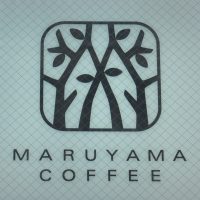 My first Tokyo coffee experience was down, in part, to the excellent Commodities Connoisseur and also to serendipity. Having done very little planning for this trip, I had picked my hotel for the first part of my stay almost at random. On arrival, I was delighted to discover that it was across the road from one of Commodities Connoisseur’s recommendations, Maruyama Coffee.
My first Tokyo coffee experience was down, in part, to the excellent Commodities Connoisseur and also to serendipity. Having done very little planning for this trip, I had picked my hotel for the first part of my stay almost at random. On arrival, I was delighted to discover that it was across the road from one of Commodities Connoisseur’s recommendations, Maruyama Coffee.
Maruyama Coffee is a roaster based in Karuizawa in the mountains northwest of Tokyo and founded in 1991 by Kentaro Maruyama. Nishi Azabu is the sixth store, one of three in Tokyo. It’s a lovely space, with plenty of seating and full table service. Although not a traditional Japanese coffeehouse (as I understand them to be), it was a very Japanese experience, far removed from the typical (western) third-wave café.
Perhaps the most surprising thing is the vast array of coffee on offer, which can be had principally through the humble cafetiere, although there are also options for Steampunk, Cores pour-over cones and espresso. If you are hungry, there is a small breakfast menu (08:00 – 10:00) and a decent selection of cake. There’s also a huge retail section, including beans, coffee-making equipment and a range of other products.
Continue reading...Meet the Roaster: Onibus Coffee
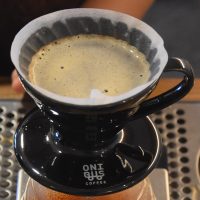 One of the things I’ve really enjoyed during my various visits to Japan is exploring its varied speciality coffee scene. There’s a strong, local tradition of roasting high-quality coffee, with an emphasis on darker roasts, epitomised by the likes of Maruyama Coffee and Sarutahiko Coffee Ebisu. However, in recent years, there’s an up-and-coming local scene where the emphasis is on lighter roasters led by the likes of today’s Meet the Roaster, Onibus Coffee.
One of the things I’ve really enjoyed during my various visits to Japan is exploring its varied speciality coffee scene. There’s a strong, local tradition of roasting high-quality coffee, with an emphasis on darker roasts, epitomised by the likes of Maruyama Coffee and Sarutahiko Coffee Ebisu. However, in recent years, there’s an up-and-coming local scene where the emphasis is on lighter roasters led by the likes of today’s Meet the Roaster, Onibus Coffee.
Onibus Coffee is a small coffee shop/roaster chain in Tokyo. Its Nakameguro location was one of my first stops when I came to Japan in 2017, my first time in the country. Back then, it also housed the roaster, in a small space behind the counter, but with the business steadily growing, the cramped conditions were proving impractical, so Onibus relocated the roastery to a new, dedicated coffee shop/roastery in Meguro.
I visited the coffee shop in September, on the first of this year’s two trips to Japan, where I was offered a tour of the roastery, scheduled for my returned in November. I gratefully accepted, heading over to the roastery in Yakumo on my first morning in Tokyo, where head roaster, Yohei, showed me around.
Continue reading...Nem Coffee & Espresso
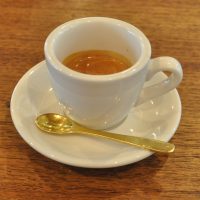 The delightful Nem Coffee & Espresso is definitely the hidden gem of Tokyo’s speciality coffee scene. Located south of the Arisugawa-no-miya Memorial Park, Nem is tucked away down a narrow, pedestrian alley, so much so that you think you’re walking into a residential neighbourhood to visit someone’s house, which is not as far from the truth as it seems. The coffee shop is on the ground floor of an old house, painstakingly renovated/converted by the owners, a married couple who live upstairs, Nem opening for business in May 2016. The result is a small, but delightful space, with windows front and back, with a very Japanese feel to the architecture, but a very western feel to the coffee shop itself.
The delightful Nem Coffee & Espresso is definitely the hidden gem of Tokyo’s speciality coffee scene. Located south of the Arisugawa-no-miya Memorial Park, Nem is tucked away down a narrow, pedestrian alley, so much so that you think you’re walking into a residential neighbourhood to visit someone’s house, which is not as far from the truth as it seems. The coffee shop is on the ground floor of an old house, painstakingly renovated/converted by the owners, a married couple who live upstairs, Nem opening for business in May 2016. The result is a small, but delightful space, with windows front and back, with a very Japanese feel to the architecture, but a very western feel to the coffee shop itself.
Talking of coffee, Nem has a concise menu, drinks split between “black” and “with milk”. There’s a house-blend on espresso (from Switch Coffee Roasters) and two single-origins plus a decaf (from Nozy Coffee) on filter through the cafetiere (hot) or Kalita Wave (cold). There’s also tea and hot chocolate, plus a small food menu, with a choice of two cakes. Small is definitely the name of the game at Nem, with all the food being cooked to order in a compact, open kitchen behind the counter.
Continue reading...Onibus Coffee, Nakameguro
 Onibus Coffee is a small chain of five coffee shops, including this, the roastery, in the residential district of Nakameguro in Tokyo. That said, it won’t be the roastery for much longer, since there are moves afoot to relocate the Diedrich roaster from the cramped space in the rear of the store to a dedicated site. Until then, enjoy the spectacle of seeing the roaster in action as you sip your coffee.
Onibus Coffee is a small chain of five coffee shops, including this, the roastery, in the residential district of Nakameguro in Tokyo. That said, it won’t be the roastery for much longer, since there are moves afoot to relocate the Diedrich roaster from the cramped space in the rear of the store to a dedicated site. Until then, enjoy the spectacle of seeing the roaster in action as you sip your coffee.
There’s outdoor seating along the side of the small, two-storey building, or you can sit upstairs, where, instead of the roaster, you can watch the trains rattling by, Onibus backing onto the elevated train tracks of the nearby station. You can’t quite touch the passing trains, but it’s close. It’s a busy line, so you’re never far from the clickety-clack of the next train (every minute or two). Personally, I enjoy the sound of the trains going by, but others might find it off-putting.
Onibus serves a simple espresso menu using one of its blends, while there’s a choice of several single-origins on pour-over through the V60. There’s also a small selection of cake, along with retail bags of the coffee and a small range of home coffee equipment.
Continue reading...Onibus Coffee, Yakumo
 Onibus Coffee is a small coffee shop/roaster chain in Tokyo. Its Nakameguro location was one of my first stops when I came to Japan in 2017, my first time in the country. Back then, it also housed the roaster, a cosy arrangement given how small the place was. However, on my return to Tokyo in September this year, I discovered that the roaster was gone, relocated to a new coffee shop/roastery in Meguro, so I headed over there to check it out.
Onibus Coffee is a small coffee shop/roaster chain in Tokyo. Its Nakameguro location was one of my first stops when I came to Japan in 2017, my first time in the country. Back then, it also housed the roaster, a cosy arrangement given how small the place was. However, on my return to Tokyo in September this year, I discovered that the roaster was gone, relocated to a new coffee shop/roastery in Meguro, so I headed over there to check it out.
The new coffee shop/roastery is Onibus’ fifth location, joining About Life Coffee Brewers and Ratio &C, plus the original location in Okusawa, which, in true Coffee Spot fashion, I’ve yet to visit! The coffee shop is a similar size to the Nakameguro coffee shop, but the roastery, which has its own Meet the Roaster feature, is in a much bigger space to the left.
The coffee shop, the subject of today’s Coffee Spot, has the usual Onibus offering, with a several (five or six) single-origins available on both pour-over and espresso, where they are joined by the Step blend. If you’re hungry, there’s a small selection of cakes, all baked in-house.
Continue reading...Ratio &C
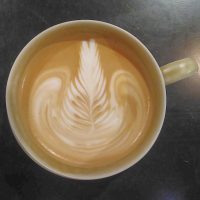 Ratio &C is part of Tokyo-based coffee shop/roaster chain, Onibus, which started in Okusawa, where it’s still going strong (and which, naturally, I’ve not yet visited). There are now five shops, including the original Nakameguro roastery/coffee shop, a new roastery/coffee shop in Yakumo, and Shibuya’s About Life Coffee Brewers. And, of course, today’s Coffee Spot, Ratio &C, a lovely coffee bar inside a cycle shop.
Ratio &C is part of Tokyo-based coffee shop/roaster chain, Onibus, which started in Okusawa, where it’s still going strong (and which, naturally, I’ve not yet visited). There are now five shops, including the original Nakameguro roastery/coffee shop, a new roastery/coffee shop in Yakumo, and Shibuya’s About Life Coffee Brewers. And, of course, today’s Coffee Spot, Ratio &C, a lovely coffee bar inside a cycle shop.
Ratio &C is a few minutes’ walk from my hotel, which is how I came to visit it when in Tokyo last October as part of my around the world trip. Back then, I’d have described Ratio &C as a classic coffee bar in cycle shop, but on my return last week, I found that the coffee shop had expanded a little, with more seating and less emphasis on the cycling. It’s a very peaceful environment, the ideal post-work spot where I could catch up with things before retiring to my hotel for the evening.
There’s the standard Onibus offering, with the Step blend on espresso for milk-based drinks. It’s also available on pour-over, along with another blend and a seasonal selection of single-origins, one of which is available on espresso each day.
Continue reading...Sarutahiko Coffee Ebisu
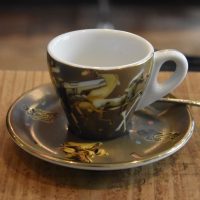 Sarutahiko Coffee in Ebisu is another places which I discovered on my first visit to Tokyo in April 2017, but never had time to write up. I first came across Sarutahiko when I found its Omotesandō branch, around the corner from my office, which shares a multi-level space with a bookshop and travel agent. This branch, opposite Ebisu train station on the Yamanote Line (amongst others) is very different, being a stand-alone shop, but it shares the two winning factors from the Omotesandō branch: excellent coffee and, in a culture where service is king, uber-friendly and welcoming staff. In fact, even if I didn’t like the coffee so much, I’d be tempted back just to see the staff.
Sarutahiko Coffee in Ebisu is another places which I discovered on my first visit to Tokyo in April 2017, but never had time to write up. I first came across Sarutahiko when I found its Omotesandō branch, around the corner from my office, which shares a multi-level space with a bookshop and travel agent. This branch, opposite Ebisu train station on the Yamanote Line (amongst others) is very different, being a stand-alone shop, but it shares the two winning factors from the Omotesandō branch: excellent coffee and, in a culture where service is king, uber-friendly and welcoming staff. In fact, even if I didn’t like the coffee so much, I’d be tempted back just to see the staff.
When it comes to coffee, Sarutahiko has one of the widest ranges of any coffee shop I know. There are six blends and six single-origins, with roasts from dark all the way to light, so there’s something for everyone. All the coffee is available as pour-over, while there’s the house-blend and a single-origin available on espresso. You can also buy retail bags of the beans, although there’s a much wider selection available in Sarutahiko’s retail shop just a few doors away.
Continue reading...Sarutahiko Coffee Omotesandō
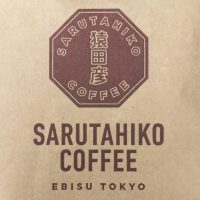 Sarutahiko Coffee is a small, but growing, coffee shop/roaster chain in Tokyo. This branch shares space with a bookshop and travel agent in HIS, a multi-level shop on a quiet street near my office, one of several excellent coffee options within a five minutes’ walk. It’s also another recommendation from the Commodities Connoisseur (although he visited the flagship Ebisu branch).
Sarutahiko Coffee is a small, but growing, coffee shop/roaster chain in Tokyo. This branch shares space with a bookshop and travel agent in HIS, a multi-level shop on a quiet street near my office, one of several excellent coffee options within a five minutes’ walk. It’s also another recommendation from the Commodities Connoisseur (although he visited the flagship Ebisu branch).
Sarutahiko roasts all its own coffee, a considerable selection of which is on sale at the Omotesandō branch. There is a variety of espresso-based drinks, either hot or over ice, while there’s a large range of single-origins (six) and blends (five) available as pour-over using the V60. Although there’s plenty of seating, the Omotesandō branch is rather unusual in that it only serves coffee in takeaway cups, so be sure to bring your own.
Sarutahiko has several neat features. For example, although it’s counter service, you are given a playing card when you order, with an identical playing card being put down on the counter with your coffee, so you know which one is yours. On the retail side, each coffee has a card with tasting and origin notes, with the card’s colour indicating the darkness of the roast. Genius!
Continue reading...Single O Tasting Bar
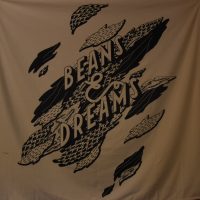 Like two of my recent Tokyo posts, today’s Saturday Short is a roastery/coffee shop, although this one, Single O, is from my current visit (I was there yesterday). Like Switch Coffee Roasters in Meguro and the now closed coffee bar at Fuglen Coffee Roasters, Single O is not somewhere you would stumble upon by accident. Somewhat off the beaten (tourist) track, down a lane off a side-street in an anonymous grid of streets in Ryogoku, east of Sumida River, it is at least noticeable when you get there. The large outside seating area is clearly visible from the street, while, if the sliding doors are fully retracted, so is the counter.
Like two of my recent Tokyo posts, today’s Saturday Short is a roastery/coffee shop, although this one, Single O, is from my current visit (I was there yesterday). Like Switch Coffee Roasters in Meguro and the now closed coffee bar at Fuglen Coffee Roasters, Single O is not somewhere you would stumble upon by accident. Somewhat off the beaten (tourist) track, down a lane off a side-street in an anonymous grid of streets in Ryogoku, east of Sumida River, it is at least noticeable when you get there. The large outside seating area is clearly visible from the street, while, if the sliding doors are fully retracted, so is the counter.
There’s not much to the tasting bar, just the aforementioned counter, beyond which, behind another set of sliding doors, is the roastery. As always, the coffee’s the draw with either the Reservoir blend on espresso or a selection of seasonal single-origins (three during my visit) as pour-overs through the V60 or Aeropress. And that’s it, other than some retail bags of coffee for sale.
Continue reading...Stockholm Roast, Tokyo
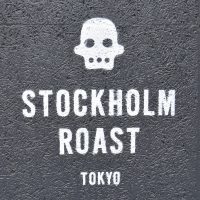 Stockholm Roast was a chance discovery on my way to the office during the second of my two trips to Tokyo in 2018. At the time, it was inside the Tobacco Stand, an old-fashioned smoke shack, for want of a better word, but this closed in September 2019, with Stockholm Roast taking over as a standalone operation.
Stockholm Roast was a chance discovery on my way to the office during the second of my two trips to Tokyo in 2018. At the time, it was inside the Tobacco Stand, an old-fashioned smoke shack, for want of a better word, but this closed in September 2019, with Stockholm Roast taking over as a standalone operation.
There’s not much to Stockholm Roast, just a small, square kiosk with a couple of stools inside at the counter, plus two tables, a wooden sofa and an armchair outside in a sheltered seating area. There are a pair of takeaway windows, one here, the other on the street, with a handful of stools, but otherwise that’s it.
Stockholm Roast gets its coffee from the roaster of the same name in Sweden, with the Transatlantic Blend on espresso, all the shots pulled on a La Marzocco Linea Mini espresso machine. This is joined by another blend (Tokyo) and two or three single-origins on pour-over, while if you're hungry, there's a daily selection of fresh cakes and pastries.
Continue reading...Switch Coffee Tokyo, Meguro
 This is the original Switch Coffee Tokyo, a small coffee shop in Meguro, which doubles as the roastery. That said, a better description is a roastery doubling as a coffee shop, the roaster occupying the bulk of the space at the back of the store, with a small counter at the front, where the coffee is served. There’s a second, equally small branch of Switch in Shibuya, by the Yoyogi-Hachiman station.
This is the original Switch Coffee Tokyo, a small coffee shop in Meguro, which doubles as the roastery. That said, a better description is a roastery doubling as a coffee shop, the roaster occupying the bulk of the space at the back of the store, with a small counter at the front, where the coffee is served. There’s a second, equally small branch of Switch in Shibuya, by the Yoyogi-Hachiman station.
The principle draw is the coffee, which is just as well, since other than a small selection of gin and wine, that’s all there is. No tea, no food, not even a cake. When it comes to coffee, there’s a house-blend on espresso, plus a single-origin filter, one of the four seasonal single-origins Switch has in stock. In an interesting twist on the batch-brew model, this is made in a large cafetiere then kept warm in a flask.
Continue reading...Switch Coffee Tokyo, Yoyogi-Hachiman
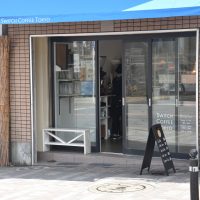 During my two visits to Tokyo, I’ve enjoyed Switch Coffee Tokyo’s coffee in both About Life Coffee Brewers, where you’ll find a pair of single-origins available as either espresso or pour-over, and Nem Coffee & Espresso, whose bespoke house-blend is roasted by Switch. However, since I’ve not yet made it down to Switch’s coffee shop/roastery in Meguro, I was delighted when the baristas at Little Nap Coffee Stand told me that Switch had opened a second branch opposite Yoyogi-Hachiman station, a mere five minutes’ walk away.
During my two visits to Tokyo, I’ve enjoyed Switch Coffee Tokyo’s coffee in both About Life Coffee Brewers, where you’ll find a pair of single-origins available as either espresso or pour-over, and Nem Coffee & Espresso, whose bespoke house-blend is roasted by Switch. However, since I’ve not yet made it down to Switch’s coffee shop/roastery in Meguro, I was delighted when the baristas at Little Nap Coffee Stand told me that Switch had opened a second branch opposite Yoyogi-Hachiman station, a mere five minutes’ walk away.
There’s not a lot to the new branch of Switch, with just the stool outside providing the only seat. Inside, it is standing-room only, with a choice of drinks from a concise espresso menu (espresso, latte or cappuccino) using Switch’s seasonal espresso blend, or batch-brew with a regularly-changing single-origin. You can also buy retail bags of beans to take home with you.
Continue reading...The Local Coffee Stand
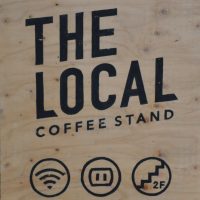 The Local Coffee Stand was a chance discovery in Tokyo, conveniently located halfway along my walk from my hotel in Shibuya and the office in Minamiaoyama. I passed it on the second day, when the A-board caught my eye, and the following day, I popped in for a cappuccino to take to the office with me. Of all the places I visited in Tokyo, it perhaps reminded me the most of a western, third-wave coffee establishment in layout as well as look and feel. It also kept what I call “western hours”, opening at 8am, whereas a lot of more traditional Japanese coffee shops don’t open until 10 o’clock or even noon.
The Local Coffee Stand was a chance discovery in Tokyo, conveniently located halfway along my walk from my hotel in Shibuya and the office in Minamiaoyama. I passed it on the second day, when the A-board caught my eye, and the following day, I popped in for a cappuccino to take to the office with me. Of all the places I visited in Tokyo, it perhaps reminded me the most of a western, third-wave coffee establishment in layout as well as look and feel. It also kept what I call “western hours”, opening at 8am, whereas a lot of more traditional Japanese coffee shops don’t open until 10 o’clock or even noon.
The Local was set up by the people behind Good Coffee, an online resource for finding good coffee in Tokyo. The coffee shop, which showcases roasters from around Japan, is on the ground floor, while the floor above is used by Good Coffee as its training centre and coffee academy. The Local’s not a huge spot, with space for maybe a dozen people in the seating area at the back, with three more at the counter. There’s espresso, bulk-brew and pour-over, plus cake for those who are hungry.
Continue reading...The Roastery by Nozy
 My first taste of Nozy’s coffee was at the lovely Nem Coffee & Espresso during my first visit to Tokyo in April 2017. I also walked past The Roastery, on Tokyo’s famous Cat Street, while taking a circuitous route back from the office, but I didn’t have time to stop. However, The Roastery was high on my must-visit list on my return, so a week ago today, I headed out early to beat the crowds, making a bee-line for The Roastery.
My first taste of Nozy’s coffee was at the lovely Nem Coffee & Espresso during my first visit to Tokyo in April 2017. I also walked past The Roastery, on Tokyo’s famous Cat Street, while taking a circuitous route back from the office, but I didn’t have time to stop. However, The Roastery was high on my must-visit list on my return, so a week ago today, I headed out early to beat the crowds, making a bee-line for The Roastery.
With the odd exception (Blue Bottle Coffee in Aoyama for example) the speciality coffee shops I’ve visited in Japan have been small. The Roastery bucks that trend, occupying a large space set back from the street, with a large outside seating area and a similarly-sized interior which doubles as a roastery, producing all Nozy’s coffee.
The coffee offering is just as big and impressive. There are no blends, just two single-origins for the limited espresso menu and another eight on pour-over, while you can buy all the beans to take home in retail bags of various sizes. There’s a small range of sweet and savoury snacks, plus perhaps the biggest draw of all in summer: soft-serve ice cream.
Continue reading...Unlimited Coffee Bar
 Unlimited Coffee Bar is almost directly under Tokyo’s famous 643m tall Skytree, which, since 2012, has been Japan’s tallest structure and the world’s tallest tower. Located just across the canal, opposite the Skytree’s southwest corner, it’s an ideal stopping off point for coffee (or lunch/dinner) either before or after taking in the magnificent views across Tokyo from the Skytree’s two observation decks. I’ve visited twice, once during my around the world trip last year, and again earlier this week on my current trip, both times calling in for coffee after a trip up the tower.
Unlimited Coffee Bar is almost directly under Tokyo’s famous 643m tall Skytree, which, since 2012, has been Japan’s tallest structure and the world’s tallest tower. Located just across the canal, opposite the Skytree’s southwest corner, it’s an ideal stopping off point for coffee (or lunch/dinner) either before or after taking in the magnificent views across Tokyo from the Skytree’s two observation decks. I’ve visited twice, once during my around the world trip last year, and again earlier this week on my current trip, both times calling in for coffee after a trip up the tower.
In contrast to the soaring tower, Unlimited Coffee Bar, an offshoot of Unlimited Coffee Roasters, is a much more modest affair, at least in terms of its physical extent, occupying the ground floor of a small, three storey building. The unlimited part refers to the coffee, with a selection of five or six single-origins, all roasted in-house, two of which are available on espresso, three on cold brew and all on pour-over via Aeropress, Silverton dripper or V60. Various tasting flights are offered, along with coffee cocktails, while all the beans are available in retail bags. Finally, for somewhere so small, there’s an impressive food menu.
Continue reading...Map
If you don’t like lists or just want to see where everything is, you can use the map to find your way around.
